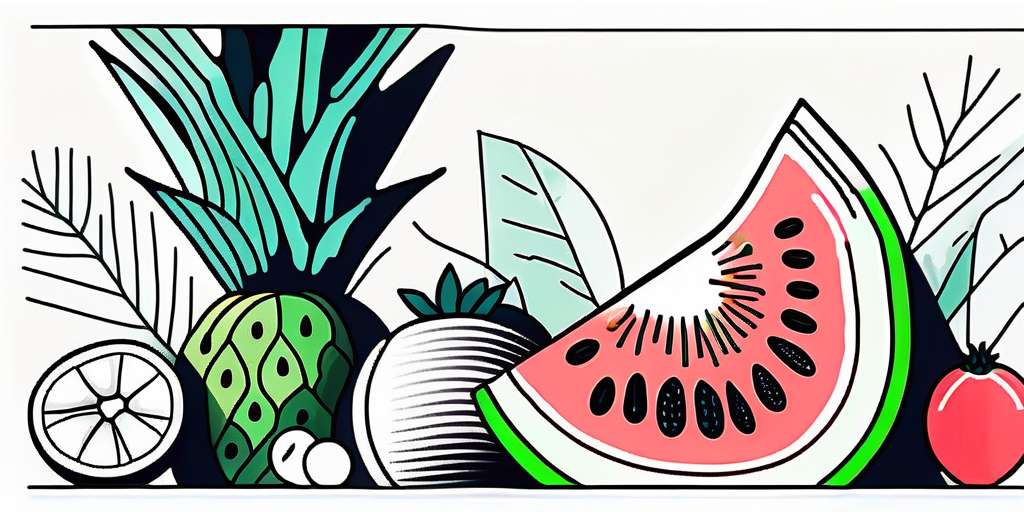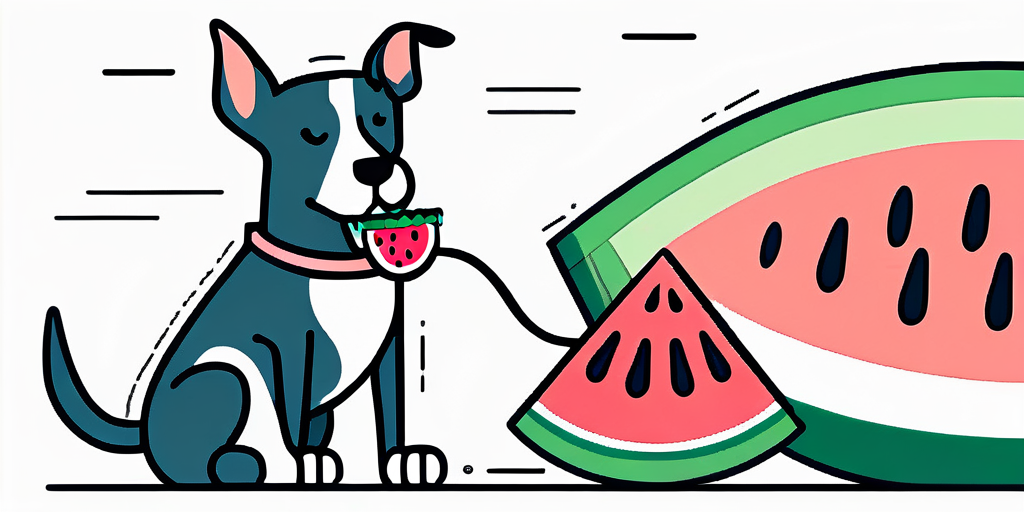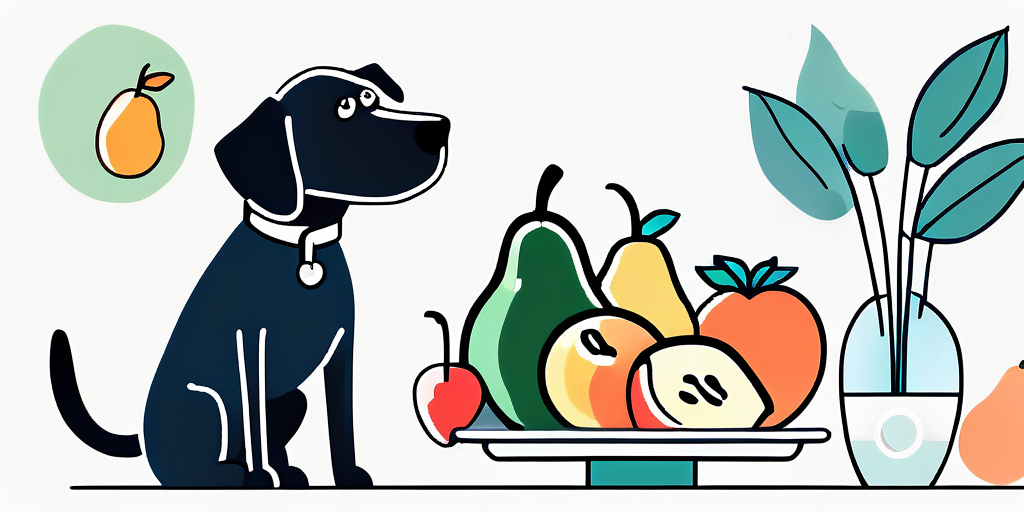Watermelon is a refreshing and delicious fruit that many people enjoy during the hot summer months. But what about our furry friends? Can dogs eat watermelon too? In this article, we will explore the topic of feeding watermelon to dogs to help you make an informed decision about including this juicy fruit in your pet’s diet. Let’s dive in!
Understanding a Dog’s Dietary Needs
Before we delve into whether dogs can eat watermelon, let’s first understand their dietary needs. Dogs are omnivores, which means they have the ability to digest both meat and plant-based foods. However, it’s important to note that not all human foods are safe for dogs to consume. The Canine Digestive System plays a crucial role in breaking down and absorbing nutrients from food.
When it comes to a dog’s diet, it’s not just about filling their bellies. Dogs require a balanced diet that includes protein, carbohydrates, fats, vitamins, and minerals to thrive. These nutrients are essential for their overall health and well-being. Protein is particularly important for dogs as it helps build and repair tissues, supports the immune system, and provides energy. Carbohydrates, on the other hand, provide a source of energy, while fats help with nutrient absorption and provide insulation.
But it’s not just about the macronutrients. Dogs also need a variety of vitamins and minerals to support their bodily functions. Vitamins such as vitamin A, B, C, and E are important for their immune system, vision, and overall health. Minerals like calcium, phosphorus, and potassium are essential for strong bones, teeth, and muscle function.
While commercial dog food usually meets their nutritional needs, adding certain fruits and vegetables can provide additional benefits. And this brings us to the question at hand – can dogs eat watermelon?
The Nutritional Value of Watermelon
Watermelon is not only tasty but also packed with essential nutrients that can benefit your furry friend. Let’s explore the vitamins and minerals found in watermelon that make it a healthy treat for dogs.

Watermelon is a delicious fruit that is not only enjoyed by humans but can also be a nutritious addition to your dog’s diet. This juicy fruit is bursting with vitamins and minerals that can support your dog’s overall health and well-being.
Vitamins and Minerals in Watermelon
Watermelon is a rich source of vitamins A and C, both of which play important roles in supporting a dog’s immune system. These vitamins help fight off infections and promote overall health. Vitamin A is essential for maintaining healthy skin and coat, while vitamin C acts as a powerful antioxidant, protecting the body against free radicals.
In addition to vitamins, watermelon also contains important minerals that are beneficial for dogs. Potassium and magnesium, found in abundance in watermelon, are essential for maintaining normal muscle and nerve function. These minerals help support your dog’s physical activity and overall mobility.
Hydration Benefits of Watermelon
With its high water content, watermelon can also help keep your dog hydrated, especially during hot weather or after physical activity. Hydration is vital for regulating body temperature and ensuring proper organ function in dogs. Offering your canine companion a few chunks of watermelon can be a refreshing way to keep them cool and hydrated.
Furthermore, watermelon is a low-calorie fruit, making it a great option for dogs who need to watch their weight. It can be a satisfying treat that provides hydration and essential nutrients without adding excessive calories to your dog’s diet.
When feeding watermelon to your dog, it’s important to remove the seeds and rind, as they can be difficult to digest and may pose a choking hazard. It’s best to offer your dog small, bite-sized pieces of watermelon to ensure safe consumption.
So, the next time you enjoy a juicy slice of watermelon, consider sharing a few bites with your furry friend. Not only will they love the sweet and refreshing taste, but they will also benefit from the vitamins, minerals, and hydration that this fruit provides.
Potential Risks of Feeding Watermelon to Dogs
While watermelon offers numerous health benefits, there are a few risks to be aware of before feeding it to your dog. Let’s discuss these potential concerns to ensure the safety of your furry friend.
Choking Hazards and Watermelon
When feeding watermelon to your dog, it’s essential to remove any seeds and cut the fruit into small, manageable pieces. Watermelon seeds can pose a choking hazard and may cause intestinal blockage if ingested. Additionally, the rind of the watermelon is tough and can be difficult for dogs to digest. Avoid feeding your furry friend the rind to prevent digestive issues.
Sugar Content in Watermelon
Watermelon is naturally sweet due to its sugar content. While the sugar found in watermelon is generally safe for dogs in moderation, it’s important to remember that excessive consumption of sugary foods can lead to weight gain and related health issues. Therefore, it’s best to offer watermelon as an occasional treat rather than a regular part of your dog’s diet.
Now that we’ve covered the potential risks of feeding watermelon to dogs, let’s delve deeper into the nutritional benefits this juicy fruit can provide. Watermelon is not only a refreshing summer snack for humans, but it can also be a hydrating and nutritious treat for your canine companion.
First and foremost, watermelon is an excellent source of hydration for dogs. With its high water content, watermelon can help keep your furry friend hydrated, especially during hot summer months or after vigorous exercise. This is particularly beneficial for dogs who may not drink enough water on their own.
In addition to its hydrating properties, watermelon is packed with essential vitamins and minerals. It is rich in vitamin A, which promotes healthy vision and immune function in dogs. The fruit also contains vitamin C, an antioxidant that supports the immune system and aids in collagen production. Furthermore, watermelon is a good source of potassium, which is important for maintaining proper muscle and nerve function in dogs.
When choosing watermelon for your dog, opt for ripe fruit that is free from mold or other signs of spoilage. Organic watermelon is even better, as it reduces the risk of pesticide exposure. Remember to always wash the watermelon thoroughly before cutting it, as this will remove any dirt or bacteria that may be present on the skin.
So, while there are potential risks associated with feeding watermelon to dogs, when prepared and offered in moderation, this juicy fruit can be a tasty and nutritious addition to your furry friend’s diet. Just remember to remove the seeds and rind, and enjoy watching your dog indulge in the refreshing sweetness of watermelon!
Safe Ways to Feed Watermelon to Dogs
Now that we’ve discussed the benefits and potential risks of feeding watermelon to dogs, let’s explore the safe ways to include this delicious fruit in their diet.

Preparing Watermelon for Your Dog
When preparing watermelon for your dog, make sure to remove all seeds and the tough rind. Dogs can have a difficult time digesting seeds, and the rind can be tough to chew and may cause gastrointestinal discomfort. By removing these parts, you can ensure that your furry friend enjoys the watermelon without any digestive issues.
Additionally, it’s important to cut the fruit into small, bite-sized pieces to avoid any choking hazards. Dogs, especially smaller breeds, may struggle with larger chunks of watermelon, so it’s best to err on the side of caution and cut the fruit into smaller, more manageable pieces. This will not only make it easier for your dog to eat, but it will also reduce the risk of choking.
Lastly, before serving the watermelon to your four-legged buddy, it’s a good practice to wash it thoroughly. This step helps remove any dirt, pesticides, or other contaminants that may be present on the surface of the fruit. By taking this extra precaution, you can ensure that your dog is consuming a clean and safe watermelon.
Portion Sizes and Frequency
While watermelon can be a healthy treat for dogs, it’s important not to overdo it. As with any new food, introduce watermelon gradually and in moderation. Start by offering a small piece and observe how your dog reacts to it. If there are no adverse effects, you can gradually increase the portion size.
However, it’s crucial to remember that watermelon should be treated as an occasional snack rather than a staple part of your dog’s diet. While it is a refreshing and nutritious fruit, it should not replace their regular meals. Dogs have specific dietary requirements, and it’s essential to provide them with a balanced and complete diet that meets their nutritional needs.
When it comes to portion control, it’s best to consult with your veterinarian. They can provide guidance on the appropriate amount of watermelon to give your dog based on their size, age, and overall health. By following their recommendations, you can ensure that your furry friend enjoys the benefits of watermelon without any negative consequences.
Other Fruits Safe for Dogs
If your dog enjoys watermelon, you may be wondering what other fruits are safe to share with your four-legged companion. Here are some dog-friendly fruits that can add variety to their diet:

Dog-Friendly Fruits:
- Apples
- Blueberries
- Strawberries
- Bananas
- Oranges
Fruits to Avoid for Dogs:
- Grapes
- Raisins
- Avocados
- Cherries
- Peaches
While these fruits are generally safe for dogs, it’s always important to introduce new foods gradually and monitor your dog for any adverse reactions. Some dogs may have food allergies or sensitivities, so it’s best to consult your veterinarian if you have any concerns.
In conclusion, watermelon can be a safe and refreshing treat for dogs when prepared and served appropriately. It offers essential vitamins, minerals, and hydration benefits while being relatively low in calories. Just remember to remove seeds, cut the fruit into small pieces, and offer it in moderation. As always, it’s wise to consult with your veterinarian before making any significant changes to your dog’s diet.
So, the next time you’re enjoying a juicy watermelon on a hot summer day, don’t forget to share a few pieces with your beloved furry friend!
